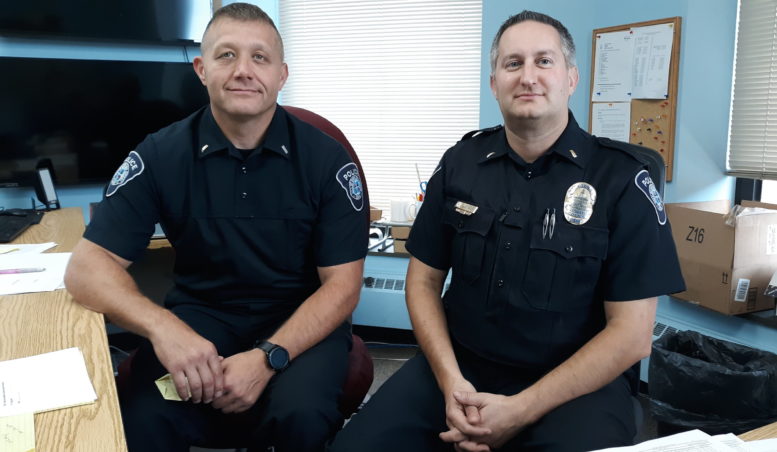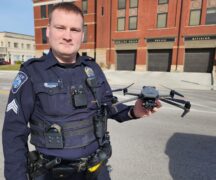By JAN LARSON McLAUGHLIN
BG Independent News
At least once a day, Bowling Green Police Division receives a report from a local resident cheated out of money by scammers.
Some suspect and stop the scam before they are out of any money. Others end up losing thousands of dollars, with little hope of recovering any of it.
They feel pressured into sending money intended to rescue a family member from jail, to prevent revealing photos from being posted, to avoid arrest by the FBI, or to clean their computer of supposed viruses.
It’s not just senior citizens who are prey to the fraud.
In the past month in Bowling Green, scammers targeted tech savvy college students, middle-aged educated professionals and retired community members.
“You would think people of our generation may be more susceptible,” BGPD Lt. Dan Mancuso said. “But it can happen to anybody.”
“No one is immune to it,” BGPD Lt. Adam Skaff said.
The scams typically start with fraudulent contact over the phone, emails, texts or pop-ups on computers.
“The technology gives people access,” Mancuso said.
Government doesn’t want gift cards
A common bit of advice from BGPD is to not fall for requests to send gift cards.
“No one from the government needs a Walmart, Apple, GooglePlay or Amazon gift card,” Skaff said. “No one is ever going to legitimately send you to Walmat to get gift cards.”
But victims of scams often react under duress, believing they need to act quickly to help a loved one or save themselves from being charged with a crime like tax evasion.
“No sheriff’s department is going to take a GooglePlay card to get someone out of jail,” Mancuso said.
“What’s the IRS going to do with GooglePlay cards?” Skaff said.
Yet intelligent people fall for these scams everyday, the officers said. And those who report the fraud are likely a small percentage of the actual victims since many are too ashamed to file a report with police.
Some unwittingly fall for false relationships that turn into demands for money.
“They think they’re talking to the girl of their dreams,” but then find out the interest is purely monetary, Skaff said.
Oftentimes, the victims are warned to not tell law enforcement of the scams. That in itself should be a red flag to people, the BG officers stressed.
Scammers have advanced since the “Nigerian prince” scams in which someone claims to be in a powerful position and needs help getting large sums of money out of their country. As the story goes, they can only do this with help – for which they will share a large piece of the pie.
“They promise to cut you in on the loot,” Mancuso said.
“If it sounds too good to be true,” Skaff said. “It is,” both officers said in unison.
Some scams are broad – asking for money to be sent to clean viruses from a computer, or sending a bogus check and asking the recipient to send them cash in exchange.
Other scams are quite specific – like one targeting a BGSU student who wanted to buy a very rare breed of dog from Australia. Arrangements were made, but kept getting more expensive, as the student was asked to pay for the flight, shots, and special seating for the dog.
“They were out 4 or 5 grand before they realized something was wrong,” Skaff said.
Scammers are inventive and slippery
“They try a million things because they work,” Mancuso said.
“These people know what they are doing. This is a business, they know what to say,” Skaff said.
Some are able to convince their victims to go to several stores to buy gift cards, then send them the numbers. In rare cases, store employees warn the customers that they are likely being targeted by scammers. But at least one BG man reported to police the scammers had told him what to say if confronted by staff at a bank or store.
Some scams are relatively small, like the incident involving people who contacted what they thought was a local towing company and paid over their phone. In that particular case, the scammers had hacked into the towing company’s website and changed the phone number.
“They are sitting there for the tow truck and it never came,” Mancuso said.
Some of the scams result in big losses. In one case, a man befriended a woman online and the fraud continued for years.
“We’ve had them well over $100,000. They’re fleecing them as much as possible,” Mancuso said. One victim sold parcels of land in order to send money to someone online, and others have purchased vehicles in other states for people who have turned out to be frauds.
Following is a sample of some of the scams reported to BGPD in the past month.
A 21-year-old BGSU student reported that he and his fiancee have a long-distance intimate relationship, in which pictures and videos are sent between the two. An unknown person became a “friend” of the student on SnapChat, and obtained a few intimate photos of him.
The “friend” told the student the photos would be posted on the internet and sent to his family and friends, unless he bought a $500 gift card. The student said he didn’t have that kind of money, and the scammer eventually said a $25 gift card would suffice.
A 29-year-old BG resident reported to police that he had met a girl online a couple weeks earlier. He was supposed to meet her at the Toledo airport that particular day, but instead got texts from her phone that someone had kidnapped her.
The BG man suspected it was a scam because he had put $300 on an Apple wallet card and gave her the code so she could buy her plane ticket. The “captors” sent him a video of her boarding a Southwest plane as proof that they had her. They also sent a picture of the ticket, which was for American Airlines.
The BG man reported it to police – just on the slim chance that the girl had been kidnapped. The number he provided for her was not a working number.
An 82-year-old BG man reported to police that he had received a call from a woman stating she was an employee of Amazon. The woman told him that there was fraud detected on his Amazon account in New York, Florida, Texas, Alabama, China and Russia. She said he would need to purchase gift cards to stop these activities. She told him which stores to visit to buy the $500 gift cards.
The man told police he bought 12 gift cards for $500 each from Rite Aid, Walmart, Meijer and Kroger, then gave the information from the back of the cards to the woman.
A 56-year-old BG man reported to police that he received a call from an unknown phone number, from a male claiming to be from U.S. Customs and Border Protection and DEA. The caller said charges had been filed against the BG man, and that sheriff’s deputies were 30 minutes from arresting him unless he withdrew money from his bank account and bought gift cards to send them.
The local man was handed off to someone else on the phone and spent the day purchasing more than $8,300 worth of gift cards from Walmart and Target stores around the BG, Perrysburg and Holland areas. After purchasing the cards, the BG man was told to scratch off the coating on the back of the cards and read the numbers over the phone, which he did.
An 84-year-old BG man reported to police that he had received a phone call from a longtime friend, who told him she was in jail in Florida for crashing into a pregnant woman. She said he needed bond money, and gave him a number for an attorney.
The local man tried to call his friend, but her phone was switched off. So he called the “attorney,” who said he needed $8,000 in bond money. The BG man said he didn’t have that much money, so he was told that $2,000 would get his friend out of jail.
The man withdrew $2,000 from his bank account and sent it via FedEx to an address in Miramar, Florida.
When his daughter heard the story, she wasn’t comfortable with the scenario. The man was able to contact co-workers of his friend, and they gave him the woman’s new phone number. When contacted, she said her phone and credit cards had been stolen, and had no idea that a scam was underway.
A 22-year-old BGSU student reported that while purchasing textbooks on her computer she received an alert stating that her computer had been hacked. She followed the link and spoke with someone she believed to be a customer service representative.
While on the phone, she shared her name, date of birth, Social Security number and bank account information. Soon after, she received a bank alert that she had been charged for a purchase on an adult website that she had not authorized. She spoke with someone she believed was a bank representative, and sent pictures of her driver’s license.
The caller convinced the woman that in order to recover and protect the remaining money in her account she should withdraw the remaining money in two separate transactions, place the money in a Bitcoin account with the QR codes they had sent her. The caller also told the woman to not contact anyone else by phone since it had been hacked.
After losing $12,300 and speaking with her parents, the student realized she had been scammed.
A 21-year-old BG man reported getting a phone call from someone claiming to be with the FBI, stating that someone had used his information to buy houses in Texas. They also said there were pending charges for money laundering and drug trafficking unless he complied. He was told to buy prepaid credit cards, and send them the card numbers so they could bait the scammers.
The BG man went to three banks to withdraw a total of $17,000. He then went to several Walmart and Kroger stores in the region, bought prepaid cards, and placed $500 on each of them, totaling $7,000. After each stop, the people on the phone demanded the card numbers and CVV codes, and he complied.
When the BG man confronted the callers that he suspected a scam, they sent him a picture of a warrant which they said would be issued if he didn’t cooperate. So he went to another Walmart to buy more prepaid cards. While he was there, he was pulled aside by an employee who advised him he was likely being scammed.
A 49-year-old BG man reported to police that he became the target of a scam after he created a Craigslist post to sell moving boxes and supplies for $100. Through email, a potential buyer said she would pay $200 for the supplies, and sent him a tracking number for a check she was sending. She asked the BG man to pay the movers with the additional funds she was sending him. He was contacted by someone identified as a mover, who requested a check, money order or gift cards in the amount of $1,600 in order to pick up the boxes.
The BG man suspected the scam and did not comply.
A 75-year-old BG man reported getting a notice on his laptop that it had been infected with the “trojan horse virus.” He was instructed to contact “Microsoft Fraud” to have the virus removed from his computer. He believed the notification to be genuine, so he contacted “Microsoft,” where someone said hackers had his financials as well and were buying child pornography with his bank accounts.
The local man was told he would need to send as much money as possible to have his computer “cleaned.” He was instructed to go to his bank to take out cash, and he was coached about what to tell the teller if they questioned his withdrawal. He was told to say he was buying a car and the seller only accepted cash.
He was then told to go to a kiosk in Toledo, where he purchased $10,000 in Bitcoins. And he was told to purchase gift cards at Sephora and Target, which he did, totaling $1,450.
What to do if you suspect a scam
BGPD advises victims to report their cases to the Ohio Attorney General’s Office. Some of the larger cases are investigated by the FBI.
But by the time the victim has reported the scam to police, the email addresses have been changed, phone numbers have been discontinued, and bank accounts where money has been transferred have been closed.
In most cases, once the money has been transferred, it’s gone, the BGPD officers said.
What should people say if approached by potential scammers?
“The short answer is ‘No,’” Mancuso said.
If you suspect something isn’t right, ask the caller to give you their phone number and offer to call them back. Or, ask for their address, then use Google Maps to see if it’s legit.





